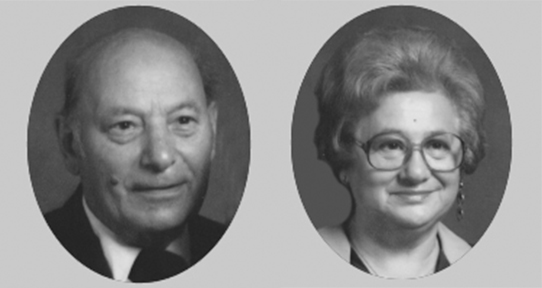Lessons from the Holocaust

Zena and Chaim Katz
"It was a huge celebration." David Katz says as he recalled his Bar mitzvah in 1959, "It was the moment my parents were able to see life had rekindled itself and we could be joyous again."
Like most Holocaust survivors, Zena and Chaim didn't talk about their experience very often, but to those around them, their pain and loss were indelible. "I remember as a young child 7 or 8 years of age waking up in the middle of the night to screaming followed by crying coming from my parent's room." David says, "It wasn't until I was much older that I realized they were having nightmares reliving the horrors they experienced and witnessed in the Holocaust."
A story of courage and resilience
Born in Vilna, Poland, Chaim, his first wife and their two children were taken to the Vilna Ghetto in 1942. Chaim was separated from his family and transported to Kaiserwald concentration camp near Riga, Latvia in 1943. He never saw his wife or two children again. At the end of 1944, Chaim was sent to the Stutthoff concentration camp close to Gdansk, Poland. He was liberated from Buchenwald in April 1945.
Zena, also born in Vilna, Poland, was taken with her mother and three sisters to the Vilna Ghetto. During the liquidation of the ghetto in 1943, she and one of her sisters were separated from their mother and two younger sisters. They were loaded onto cattle cars and transported to several concentration camps. In 1944, Zena and her sister were moved by ship and open wagons to the Stutthoff concentration camp. Her two younger teenage sisters were killed only a few weeks before liberation.
It was after liberation that Chaim and Zena connected. They were married in October 1945 in Lodz, Poland and began to rebuild their lives.
"It was the courage and resilience it took for my parents to move forward that I try to honour through Holocaust education," says David.
Creating a legacy through Holocaust education
David and his wife April set up the Zena and Chaim Katz Family Endowment to support students taking part in UVic's I-witness Holocaust Field School Project. David says, "It is so important that people can stand on the ground where the atrocities happened. It makes it real and not just a story."
Since 2011, 84 UVic students have travelled to central Europe to explore how the Holocaust is memorialized and to build an understanding of how the lessons of the Holocaust are relevant in today's world. "The experience is life changing," says Julianna Neilsen, a third-year history student who was supported by the Katz's generosity. "Since returning home, I've begun to find ways to create productive discussions on the histories we tell ourselves and futures we strive to create."
For David and April, seeing the I-witness Field School Project nurture a sense of social responsibility in students is part of the legacy they hoped to create.
David says, "The greatest gift we can give my parents is to ensure the lessons from the Holocaust change the way the world sees humanity and encourage UVic students to make positive changes in their communities and beyond."
